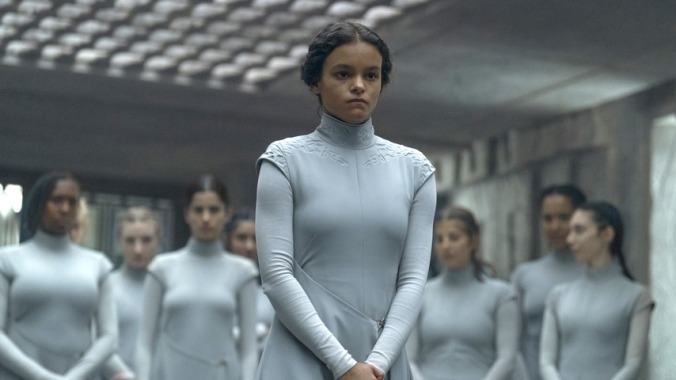Dune: Prophecy Cast and Crew Discuss the Rise of the Bene Gesserit and the New Era for the Dune-iverse
Photo courtesy of Max
The Bene Gesserit step into the spotlight with Dune: Prophecy.
The Dune universe, with its intricate politics, vast landscapes, and philosophical discussion, has captivated audiences for decades. With the premiere of Dune: Prophecy on Max on Nov. 17, the saga returns, this time diving into the complex history of the Bene Gesserit and the early power struggles that would ultimately shape the universe. Based on Sisterhood of Dune, the novel by Brian Herbert and Kevin J. Anderson, this series takes viewers 10,000 years before the rise of Paul Atreides, shedding light on a period unexplored in the Dune films. The series explores the origins of the Sisterhood, an organization of women who train mentally and physically to strengthen and obtain superhuman powers. The show delves into their rise to power and the empire they helped forge, offering a fresh perspective on the formative events that set the stage for the epic saga fans have come to know and love.
At the heart of Dune: Prophecy is the Harkonnen sisters: Valya, played by Emily Watson, and Tula, played by Olivia Williams. The show dives into their complex relationship, roles within the Sisterhood, and the forces threatening to undo the careful balance they have worked to maintain.
In the series, Valya Harkonnen, the Mother Superior of the Sisterhood, is fiercely motivated to preserve and expand the power of the Bene Gesserit. “Valya is deeply committed to the Sisterhood’s mission and must navigate external threats that could undo everything they’ve worked for,” says Emily Watson. “Her challenge is balancing her loyalty to the Sisterhood with the knowledge that there are forces beyond their control that could unravel their carefully laid plans.”
Olivia Williams portrays Tula Harkonnen, Valya’s younger sister, who must grapple with her role within the Sisterhood. “Tula’s life has always been lived in the shadow of Valya,” Williams explains. “But when a crisis strikes, Tula is thrust into a position of leadership, which challenges her sense of self and her place in the world.” Tula’s arc is one of transformation, as she is forced to confront the limitations of her upbringing and rise to meet the demands of a rapidly changing universe.
Watson and Williams share a professional bond and experience that translates seamlessly into their roles as the powerful Harkonnen sisters in Dune: Prophecy. “Finally getting to work with the great Emily Watson, who I’ve known since I was in my 20s, and as sisters [who are] trying to control the universe,” says Olivia Williams. “It’s very nice to play middle-aged women who aren’t picking up the kids from school or putting the dinner in the oven…To have our minds and our bodies used as I see them reflected in life. Women of our age are at the peak of their powers, professionally and [by] putting all their experience into practice, and we certainly get to do that.”
Their history of working parallel to each other in the industry, combined with the gravitas they bring to their roles, makes their portrayal of the Harkonnen sisters—Valya and Tula—particularly compelling. Their dynamic, rooted in personal chemistry and professional expertise, adds complexity to their performances as their characters navigate power struggles, interpersonal conflict, and existential challenges within the universe of Dune.
While the Harkonnen sisters’ story forms the series’ backbone, Dune: Prophecy also introduces a new generation of characters dealing with the pressures of legacy, family, and power. Josh Heuston’s Constantine Corrino, the son of the Emperor, is torn between his father’s expectations and his vices. “Constantine’s life is about seeking approval from his father while also attempting to define himself outside of his family’s shadow,” Heuston explains. “His journey is about finding where he belongs in the larger power structures of the universe, and how he can navigate his identity within those constraints.”
Chris Mason’s Keiran Atreides, a royal swordmaster, faces different conflicts. “[Keiran’s] great uncle, Vorian Atreides, was a war hero in the fight against the machines. His name carries a ton of respect, which he uses intelligently to get to the position he wants. But he also wants to embody the traits of loyalty and justice his family is known for—looking out for the little man.” (For fans of the Dune films eager to draw a link to the stories directed by Denis Villeneuve, it is currently unclear what link Keiran has to Paul Atreides, played by Timothée Chalamet in the films.)
Meanwhile, Sarah-Sofie Boussnina plays Princess Ynez Corrino, the independent heir to the Corrino throne, who seeks to strengthen her political position through an alliance with the Bene Gesserit. “Ynez’s journey is about learning to balance her role as heir to the throne with her personal desire to learn from the Sisterhood,” says Boussnina. “The deeper she gets into their world, the more she realizes how much their influence will shape her future.”
The Sisterhood is an essential force in the Dune universe, and Dune: Prophecy shines a light on the acolytes who will eventually become the powerful women of the Bene Gesserit. Chloe Lea plays Sister Lila, a young acolyte whose deep empathy and strong connection to the mission of the Sisterhood set her apart. “For Lila, growing up in the Sisterhood is everything,” Lea says. “She completely trusts the mission and just wants to find her place in it. Her journey is about discovering who she is and what she can contribute to this greater cause.”
-

-

-

-

-

-

-

-

-

-

-

-

-

-

-

-

-

-

-

-

-

-

-

-

-

-

-

-

-

-

-

-

-

-

-

-

-

-

-

-








































